
Jean Antoine Watteau Painting Reproductions 2 of 3
1684-1721
French Rococo Painter
66 Watteau Paintings
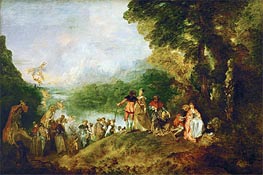
Pilgrimage to Cythera 1717
Oil Painting
$3533
$3533
Canvas Print
$62.11
$62.11
SKU: WJA-8248
Jean Antoine Watteau
Original Size: 129 x 194 cm
Louvre Museum, Paris, France
Jean Antoine Watteau
Original Size: 129 x 194 cm
Louvre Museum, Paris, France
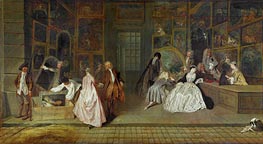
The Gersaint Shop Sign 1721
Oil Painting
$6088
$6088
Canvas Print
$61.75
$61.75
SKU: WJA-13319
Jean Antoine Watteau
Original Size: 163 x 308 cm
Schloss Charlottenburg, Berlin, Germany
Jean Antoine Watteau
Original Size: 163 x 308 cm
Schloss Charlottenburg, Berlin, Germany
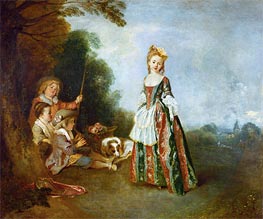
The Dance (Iris) c.1719
Oil Painting
$2821
$2821
Canvas Print
$77.77
$77.77
SKU: WJA-13320
Jean Antoine Watteau
Original Size: 97 x 116 cm
Gemaldegalerie, Berlin, Germany
Jean Antoine Watteau
Original Size: 97 x 116 cm
Gemaldegalerie, Berlin, Germany
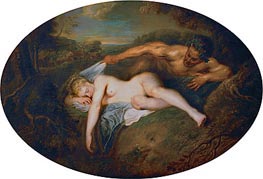
Nymph and Satyr c.1715/16
Oil Painting
$2745
$2745
Canvas Print
$63.81
$63.81
SKU: WJA-13321
Jean Antoine Watteau
Original Size: 73.5 x 107.5 cm
Louvre Museum, Paris, France
Jean Antoine Watteau
Original Size: 73.5 x 107.5 cm
Louvre Museum, Paris, France
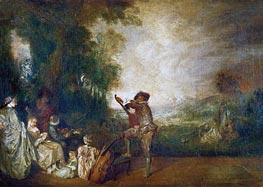
The Concert (The Music Lesson) 1717
Oil Painting
$3137
$3137
Canvas Print
$66.70
$66.70
SKU: WJA-13322
Jean Antoine Watteau
Original Size: 66 x 91 cm
Schloss Charlottenburg, Berlin, Germany
Jean Antoine Watteau
Original Size: 66 x 91 cm
Schloss Charlottenburg, Berlin, Germany
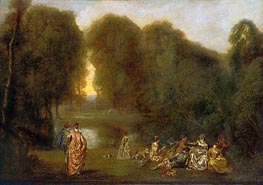
Company in a Park c.1716/17
Oil Painting
$2541
$2541
Canvas Print
$61.75
$61.75
SKU: WJA-13323
Jean Antoine Watteau
Original Size: 32.5 x 46.5 cm
Louvre Museum, Paris, France
Jean Antoine Watteau
Original Size: 32.5 x 46.5 cm
Louvre Museum, Paris, France
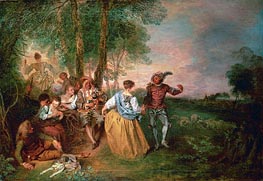
The Shepherds n.d.
Oil Painting
$4253
$4253
Canvas Print
$64.67
$64.67
SKU: WJA-13324
Jean Antoine Watteau
Original Size: unknown
Schloss Charlottenburg, Berlin, Germany
Jean Antoine Watteau
Original Size: unknown
Schloss Charlottenburg, Berlin, Germany
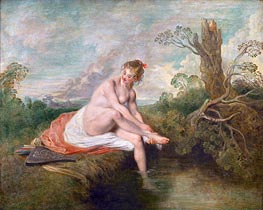
Diana Bathing c.1715/16
Oil Painting
$2483
$2483
Canvas Print
$74.70
$74.70
SKU: WJA-13325
Jean Antoine Watteau
Original Size: 80 x 101 cm
Louvre Museum, Paris, France
Jean Antoine Watteau
Original Size: 80 x 101 cm
Louvre Museum, Paris, France
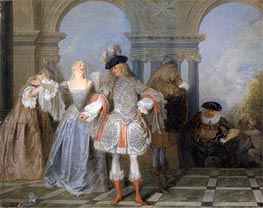
The French Comedians c.1720/21
Oil Painting
$3106
$3106
Canvas Print
$73.85
$73.85
SKU: WJA-13326
Jean Antoine Watteau
Original Size: 57.2 x 73 cm
Metropolitan Museum of Art, New York, USA
Jean Antoine Watteau
Original Size: 57.2 x 73 cm
Metropolitan Museum of Art, New York, USA
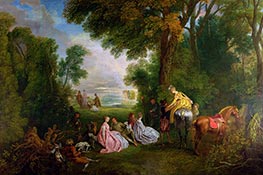
The Halt during the Chase c.1717/12
Oil Painting
$5789
$5789
Canvas Print
$61.75
$61.75
SKU: WJA-13327
Jean Antoine Watteau
Original Size: 124.5 x 189 cm
The Wallace Collection, London, UK
Jean Antoine Watteau
Original Size: 124.5 x 189 cm
The Wallace Collection, London, UK
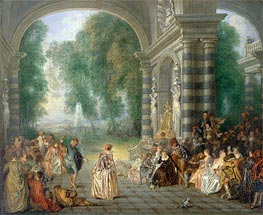
Pleasures of the Ball c.1715/17
Oil Painting
$6012
$6012
Canvas Print
$106.43
$106.43
SKU: WJA-13328
Jean Antoine Watteau
Original Size: 52.6 x 65.4 cm
Dulwich Picture Gallery, London, UK
Jean Antoine Watteau
Original Size: 52.6 x 65.4 cm
Dulwich Picture Gallery, London, UK
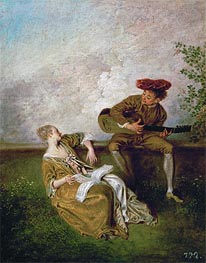
The Singing Lesson (Guitarist and Young Lady with ... c.1717/19
Oil Painting
$2295
$2295
Canvas Print
$61.75
$61.75
SKU: WJA-13329
Jean Antoine Watteau
Original Size: 24.3 x 18.4 cm
Prado Museum, Madrid, Spain
Jean Antoine Watteau
Original Size: 24.3 x 18.4 cm
Prado Museum, Madrid, Spain
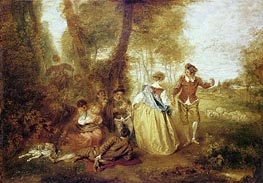
Pastoral Pleasures c.1716
Oil Painting
$2663
$2663
Canvas Print
$61.75
$61.75
SKU: WJA-13330
Jean Antoine Watteau
Original Size: 31 x 44 cm
Musee Conde, Chantilly, France
Jean Antoine Watteau
Original Size: 31 x 44 cm
Musee Conde, Chantilly, France
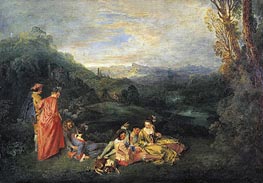
Love in the Country (Peaceful Love) c.1718/19
Oil Painting
$3095
$3095
Canvas Print
$65.01
$65.01
SKU: WJA-13331
Jean Antoine Watteau
Original Size: 56 x 81 cm
Schloss Charlottenburg, Berlin, Germany
Jean Antoine Watteau
Original Size: 56 x 81 cm
Schloss Charlottenburg, Berlin, Germany
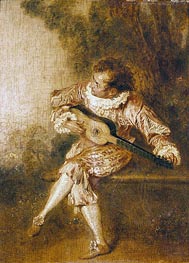
The Serenader (Guitar Player) n.d.
Oil Painting
$1853
$1853
Canvas Print
$61.75
$61.75
SKU: WJA-13332
Jean Antoine Watteau
Original Size: 24 x 17 cm
Musee Conde, Chantilly, France
Jean Antoine Watteau
Original Size: 24 x 17 cm
Musee Conde, Chantilly, France
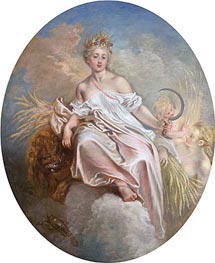
Ceres (Summer) c.1715/16
Oil Painting
$3274
$3274
Canvas Print
$76.57
$76.57
SKU: WJA-13333
Jean Antoine Watteau
Original Size: 141.6 x 115.7 cm
National Gallery of Art, Washington, USA
Jean Antoine Watteau
Original Size: 141.6 x 115.7 cm
National Gallery of Art, Washington, USA
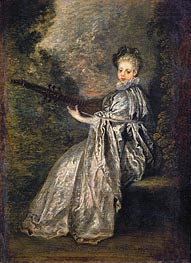
La Finette c.1717
Oil Painting
$1684
$1684
Canvas Print
$61.75
$61.75
SKU: WJA-13334
Jean Antoine Watteau
Original Size: 25.5 x 19 cm
Louvre Museum, Paris, France
Jean Antoine Watteau
Original Size: 25.5 x 19 cm
Louvre Museum, Paris, France
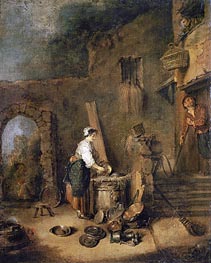
The Cook n.d.
Oil Painting
$2579
$2579
Canvas Print
$72.14
$72.14
SKU: WJA-13335
Jean Antoine Watteau
Original Size: 53 x 44 cm
Art Museums, Strasbourg, France
Jean Antoine Watteau
Original Size: 53 x 44 cm
Art Museums, Strasbourg, France
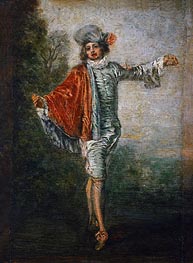
L'Indifferent c.1717
Oil Painting
$1582
$1582
Canvas Print
$61.75
$61.75
SKU: WJA-13336
Jean Antoine Watteau
Original Size: 25.5 x 19 cm
Louvre Museum, Paris, France
Jean Antoine Watteau
Original Size: 25.5 x 19 cm
Louvre Museum, Paris, France
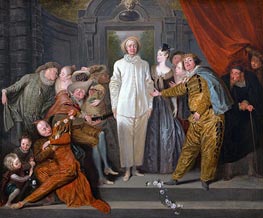
Italian Comedians c.1720
Oil Painting
$4456
$4456
Canvas Print
$77.59
$77.59
SKU: WJA-13337
Jean Antoine Watteau
Original Size: 63.8 x 76.2 cm
National Gallery of Art, Washington, USA
Jean Antoine Watteau
Original Size: 63.8 x 76.2 cm
National Gallery of Art, Washington, USA
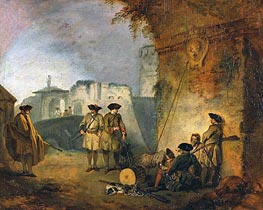
The Portal of Valenciennes c.1709/10
Oil Painting
$2705
$2705
Canvas Print
$61.75
$61.75
SKU: WJA-13338
Jean Antoine Watteau
Original Size: 32.5 x 40.5 cm
Frick Collection, New York, USA
Jean Antoine Watteau
Original Size: 32.5 x 40.5 cm
Frick Collection, New York, USA
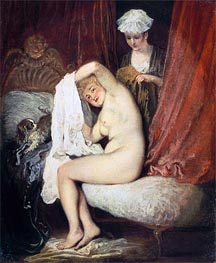
A Lady at her Toilet c.1716/17
Oil Painting
$2295
$2295
Canvas Print
$61.75
$61.75
SKU: WJA-13339
Jean Antoine Watteau
Original Size: 45.2 x 37.8 cm
The Wallace Collection, London, UK
Jean Antoine Watteau
Original Size: 45.2 x 37.8 cm
The Wallace Collection, London, UK
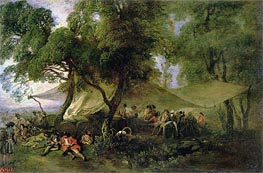
Respite from War c.172/15
Oil Painting
$2386
$2386
Canvas Print
$61.75
$61.75
SKU: WJA-13340
Jean Antoine Watteau
Original Size: 21.5 x 33.5 cm
The State Hermitage Museum, St. Petersburg, Russia
Jean Antoine Watteau
Original Size: 21.5 x 33.5 cm
The State Hermitage Museum, St. Petersburg, Russia
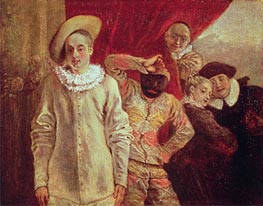
Harlequin, Pierrot and Scapin, Actors from the ... n.d.
Oil Painting
$1936
$1936
Canvas Print
$63.12
$63.12
SKU: WJA-13341
Jean Antoine Watteau
Original Size: unknown
Public Collection
Jean Antoine Watteau
Original Size: unknown
Public Collection